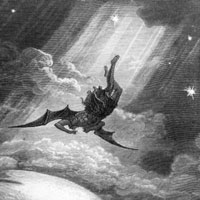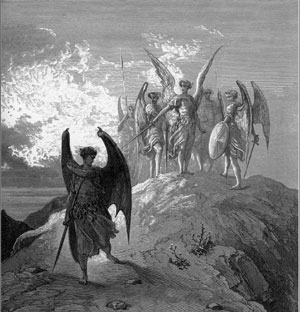 The character Satan in Paradise Lost has generated almost as much controversy as John Milton himself. Both are the victims of guilt by association: Satan becomes a Classical tragic hero, and John Milton becomes a Puritan. Ironically, both receive a considerable promotion with these misleading categorizations. Satan becomes a "better person" than Milton intended him to be, and Milton himself is unburdened of his heretical doctrines and made to be an Orthodox Christian of the noblest stripe.
The character Satan in Paradise Lost has generated almost as much controversy as John Milton himself. Both are the victims of guilt by association: Satan becomes a Classical tragic hero, and John Milton becomes a Puritan. Ironically, both receive a considerable promotion with these misleading categorizations. Satan becomes a "better person" than Milton intended him to be, and Milton himself is unburdened of his heretical doctrines and made to be an Orthodox Christian of the noblest stripe.
Romantic poets like Percy Bysshe Shelley and George Gordon (Lord Byron) are most guilty of the first blunder. While it's true that John Milton was steeped in Classical literature and philosophy, it's also true that he was very much a child of his times: the Protestant Reformation had taken firm root in England (this was the era of Oliver Cromwell), and men everywhere were re-examining doctrines that the Roman Catholic Church had taught for centuries.
Notions of Milton's unbridled Classicism led to the belief that his depiction of Satan in Paradise Lost was modeled primarily on Greek heroes like Oedipus, as well as Aristotle's notions of tragedy as laid out in the Poetics. The tragic hero of ancient literature was a great man who nevertheless had a fatal flaw—hubris, or excessive pride. This flaw always led the hero to discover something about himself which then brought him low, usually in the most deplorable circumstances.
 At first glance, Milton's Satan seems to fit the description. He is a noble angel, brought low by his incomprehensible vanity and pride, and cast largely in a tragic light. But that's where the similiarities between Satan and the tragic hero end. Most important, perhaps, is the fact that Milton tempers his tragic depiction of Satan with elements of Satan as buffoon. This draws more on Medieval Christian mystery plays than Classical literature, and is an attempt to make Satan appear less scary and less truly powerful.
At first glance, Milton's Satan seems to fit the description. He is a noble angel, brought low by his incomprehensible vanity and pride, and cast largely in a tragic light. But that's where the similiarities between Satan and the tragic hero end. Most important, perhaps, is the fact that Milton tempers his tragic depiction of Satan with elements of Satan as buffoon. This draws more on Medieval Christian mystery plays than Classical literature, and is an attempt to make Satan appear less scary and less truly powerful.
If you aren't familiar with Paradise Lost, it'll be helpful to know that it tells the story of the creation of the world, Satan's rebellion against God and the consequent war in Heaven, the Fall of mankind, and the curses of God. The Classical interpretation of Satan's character (supported in recent times by Harold Bloom) focuses on his "noble" fight against tyranny and the tragedy of such a being's fall from Heaven.
But (and this interpretation is supported by C. S. Lewis), Satan in Milton's epic poem is also seen as a blunderer, a kind of cosmic clown taking petty vengeance on mankind because of his own failures. Of course, Milton nowhere suggests that sin or death are petty, only that Satan's motivations were pettiness and guilt. This view of Milton's work makes infinitely more sense: as a Protestant (even a heterodox Protestant), Milton would never have promoted Satan's actions, or wanted to make us feel sympathy or empathy for the great enemy of humanity.
It wasn't Milton's view on sin or the Devil that excluded him from the bounds of orthodoxy, after all. It was his view of Jesus—that He was God, yet subordinate to the Father and with no distinction between His human and divine natures—which ultimately made him less than orthodox. This also excluded him automatically from the Puritan sphere, at least theologically: the Puritans were known not only for their godly lives, but for their fierce adherence to biblical doctrine.
 This doesn't mean the message of Paradise Lost is ultimately un-Christian. In fact, Milton's doctrine of the Fall, sin, mankind, and salvation through Jesus Christ are largely orthodox. Further, his excellent but seldom-read sequel, Paradise Regained, is about Jesus' temptation by Satan in the wilderness, and focuses on Christ's role as the second Adam who defeated the Devil by resisting his wiles, a feat Adam couldn't accomplish.
This doesn't mean the message of Paradise Lost is ultimately un-Christian. In fact, Milton's doctrine of the Fall, sin, mankind, and salvation through Jesus Christ are largely orthodox. Further, his excellent but seldom-read sequel, Paradise Regained, is about Jesus' temptation by Satan in the wilderness, and focuses on Christ's role as the second Adam who defeated the Devil by resisting his wiles, a feat Adam couldn't accomplish.
Read thus, Paradise Lost gains new depth, though it also acquires new dangers. Neither of these perspectives (concerning the role of Satan or Milton's orthodoxy) in any way diminish the joy of reading this epic poem, however. Milton is of all great poets perhaps the most accessible, and one of the most capable of rendering ideas and things beautiful. If you haven't read Paradise Lost yet, do so as soon as possible; if you have, reading it again will transcend the first experience, and help you enjoy it even more.
 |
Review by C. Hollis Crossman
C. Hollis Crossman used to be a child. Now he is a husband and father, teaches adult Sunday school in his Presbyterian congregation, and likes weird stuff. He might be a mythical creature, but he's definitely not a centaur.Read more of his reviews here.
|
Edition Comparisons

John Milton was an English poet born in 1608 in London. His father, John Milton Sr., was a Protestant and composer and scrivener, or scribe. He attended Cambridge and dedicated years to self-directed study, which resulted in his mastery of eight languages: Latin, Greek, Hebrew, French, Spanish, Italian, Old English and Dutch. Today he is considered by many to be the most learned of all English poets. A blind and impoverished Milton composed his 649-line Paradise Lost in blank verse between 1658 and 1664, before dying in 1974 of kidney failure. Originally published in 1667 as a ten-book series, Paradise Lost was revised the same year Milton died and was divided into twelve volumes. Isaac Watts remarked that "Mr. Milton is esteemed the parent and author of blank verse among us," and for hundreds of years countless poets like William Blake, Alexander Pope and William Wordsworth considered his work the pinnacle of English poetry and strove to emulate his genius.
We offer several versions of Paradise Lost. Since Milton composed his masterpiece in our mother tongue, the reviews below won't critique lyrical interpretation or stanza breaks. Instead, we're simply letting you know about the extra content in each book.
The first, a Penguin Classics softcover (2000) was edited by John Leonard. Leonard wrote a long introduction detailing Milton's life and literary methods, which will help ordinary readers delve into the philosophy and theology behind the great epic. A three-page table of dates is included. Veritas' Omnibus VI program uses this edition. Every fifth line is numbered and notes are included at the end of the book.
The second version, in Dover Paperback form, was edited by Susan L. Rattiner. It includes extensive notes by John A. Himes at the end of the book. Himes' notes seem a bit more readable and expanded when compared to Leonard's--but both men provide solid, scholarly content. Himes' notes take up roughly half of the book, and Leonard's roughly over a third. Line numbers appear every tenth line in Himes' edition.
Burton Raffel edited the Annotated Milton, which encludes Paradise Lost in its entirety, Paradise Regained, Samson Agonistes, "Lycidas," and many other miscellaneous poems. Paradise Regained, first published in 1671, is Milton's dramatic attempt to retell the story of Christ's temptationas found in the gospel of Luke. Burton includes a short introduction at the beginning of the book and brief footnotes at the bottom of each page. A chronology of Milton's life is also included before the introduction. Every line is numbered in this edition.
The Bloom's Modern Critical Interpretations edition of Paradise Lost opens with an introductory essay by Yale professor Harold Bloom, followed by seven essays by various scholars. The book includes a chronology of Milton's life, notes on the scholars who contributed to the volume, and a bibliography. The publishers of Bloom's Modern Critical Interpretations, a series of over 100 books, claim they present the best current criticism on the most widely read and studied poems, novels, and dramas of the Western world. Essays include "Milton and Transumption," "Eve, Evening, and the Labor of Reading in Paradise Lost," and "The Gender of Milton's Muse and the Problem of the Fit Reader."
Another excellent academic option is the Norton Critical Edition, edited by Gordon Teskey. The book begins with a life of Milton and some notes on the text. Then come the twelve books of Paradise Lost, supplemented by hundreds of extremely helpful footnotes that illuminate Milton's extensive Classical references, his sometimes obscure vocabulary, and much more. At the end of the volume are selections from the Bible and Milton's prose work, and almost 300 pages of critical essays broken into two sections: Classical Criticism and Modern Criticism. There are also a glossary of names and suggestions for further reading. If you want to really know Milton's great work, this is the version you should read.
Leland Ryken wrote an incredibly helpful little guide to Paradise Lost, which is part of the Christian Guides To The Classics series. One thing that makes Ryken's book (and series in general) appealing is his completely Christian approach to classics.
Each book in Ryken's series:
- Includes an introduction to the author and work
- Explains the cultural context
- Incorporates published criticism
- Contains discussion questions at the end of each unit of the text
- Defines key literary terms
- Lists resources for further study
- Evaluates the classic text from a Christian worldview
In addition to the versions of Paradise Lost and the two guides listed above, we carry Dover's edition of Dore's Illustrations for "Paradise Lost." A tall, thin paperback with 50 full-page engravings, this is a wonderful book to go along with whichever version of Paradise Lost you decide to buy. Lines from the poem are included beneath each illustration, along with line numbers. Gustave Dore's complex works of art are best viewed in large format, and only the Flame Tree edition of the Paradise Lost texts we carry features any illustrations at all.
Did you find this review helpful?